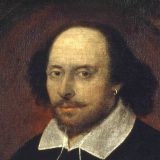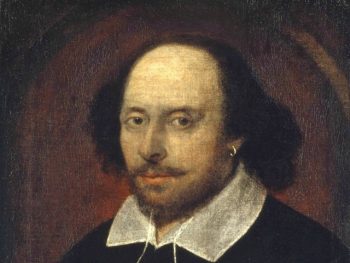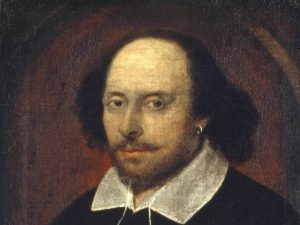
Alan Tarica: Exploring the sonnets and authorship of William Shakespeare – An article by Bob Taylor
Since William Shakespeare’s death nearly 400 years ago, there has been a raging debate about the true authorship of the plays and sonnets that bear his name.
Numerous theories exist and, chances are, the controversy will continue for four more centuries and beyond. For now it is a largely an intellectual exercise. But the various arguments present fascinating possibilities much like who was the model for Leonardo da Vinci’s “Mona Lisa” and who really was Jack the Ripper.
It is Shakespeare, however, who captured the imagination of Alan Tarica in the mid-90s while debating a colleague in a bar about how the sciences seem to self-correct while, in his own mind, the humanities “lacked such capability.”
As Tarica points out, he has no formal training in the humanities and came to his project with a a lifelong interest in science and the history and philosophy of science. While searching for validation for his argument, Tarica “accidentally” began probing Shakespeare’s sonnets. Because he came to the subject by chance, Tarica had no preconceived notions which only fueled his curiosity further.
One theory particularly intrigued Tarica. Known as the Prince Tudor theory (also called the Tudor Rose theory), some experts believe that Edward de Vere, the 17th Earl of Oxford, and Queen Elizabeth I were lovers with a child who was raised as Henry Wriothesley, the 3rd Earl of Southampton. The key element that roused Tarica’s curiosity that it might have been the Earl of Oxford who wrote under the name of “William Shakespeare” can be found in the dedications of two epic poems; “Venus & Adonis” and “The Rape of Lucrece.”
As Alan sees it, both works are totally compatible with a paternal vantage point. From this revelation, Tarica began randomly rereading the Shakespearean sonnets. Eventually, two poems in particular registered with particular poignancy. Sonnet 104 was especially strong from the standpoint of the language as though it had been written for a young child.
The other poem is Sonnet 13 which, as Alan sees it, clearly refers to a mother who does not recognize her own child. Says Tarica, “This led to a gradual but surprisingly fast development of an understanding of all the various metaphors, metonyms, and symbolism embedded in the sonnets which I think clearly infer the concealment of this secret prince. I gained a general sense of the pattern of the Sonnets and then recognized that the W.H. in the dedication (as opposed to H.W.) and the seemingly backward chronology being an important potential clue.”
Working your way through Alan Tarica’s website is a bit like the deductive process in solving a Sherlock Holmes mystery. Realizing that the initials “W.H.” were reversed in the dedications of the two poems mentioned above, Tarica came up with the idea that perhaps the sonnets would be better interpreted in reverse order as well.
Browse through the sonnets and discover Tarica’s meticulous research that is filled with detailed notes and observations. “This project has been an eye opener for me in so many ways,” he says. “It has taught me so much about human psychology and social behavior. And I’ve been happy to employ it as a way of revealing how dogmatic and unreasonable people can be with respect to challenges to orthodox notions.”
Tarica describes his two decade effort as a series of “little epiphanies.” For those with a curiosity about Elizabethan literature and the origins of Shakespeare’s writings. Alan Tarica’s website is a treasure trove of information and discovery.
As Tarica puts it, “I’ve illustrated to so many they are left with the choice of deciding if I’ve written an incredible conspiracy theory with an amazingly rich historical and political back-story and all utilizing Shakespeare’s very own completely unadulterated words versus the notion that virtually every English speaking university is teaching complete nonsense as if it was incontrovertible fact.” As Tarica sees it, “the project is not finished in the least. I don’t think a project like this can ever be finished.”
For Alan Tarica, Shakespeare’s sonnets, or whoever else might have written them, has become a perpetual source of discovery and intrigue.
For lovers of Shakespeare, words, controversy or any combination of the three, Alan Tarica’s research opens a bold new world of Elizabethan literary possibilities.
Bob Taylor has been traveling the world for more than 30 years as a writer and award winning television producer focusing on international events, people and cultures around the globe. Taylor is founder of The Magellan Travel Club.
Since William Shakespeare’s death nearly 400 years ago, there has been a raging debate about the true authorship of the plays and sonnets that bear his name.
Numerous theories exist and, chances are, the controversy will continue for four more centuries and beyond. For now it is a largely an intellectual exercise. But the various arguments present fascinating possibilities much like who was the model for Leonardo da Vinci’s “Mona Lisa” and who really was Jack the Ripper.
It is Shakespeare, however, who captured the imagination of Alan Tarica in the mid-90s while debating a colleague in a bar about how the sciences seem to self-correct while, in his own mind, the humanities “lacked such capability.”
As Tarica points out, he has no formal training in the humanities and came to his project with a a lifelong interest in science and the history and philosophy of science. While searching for validation for his argument, Tarica “accidentally” began probing Shakespeare’s sonnets. Because he came to the subject by chance, Tarica had no preconceived notions which only fueled his curiosity further.
One theory particularly intrigued Tarica. Known as the Prince Tudor theory (also called the Tudor Rose theory), some experts believe that Edward de Vere, the 17th Earl of Oxford, and Queen Elizabeth I were lovers with a child who was raised as Henry Wriothesley, the 3rd Earl of Southampton. The key element that roused Tarica’s curiosity that it might have been the Earl of Oxford who wrote under the name of “William Shakespeare” can be found in the dedications of two epic poems; “Venus & Adonis” and “The Rape of Lucrece.”
As Alan sees it, both works are totally compatible with a paternal vantage point. From this revelation, Tarica began randomly rereading the Shakespearean sonnets. Eventually, two poems in particular registered with particular poignancy. Sonnet 104 was especially strong from the standpoint of the language as though it had been written for a young child.
The other poem is Sonnet 13 which, as Alan sees it, clearly refers to a mother who does not recognize her own child. Says Tarica, “This led to a gradual but surprisingly fast development of an understanding of all the various metaphors, metonyms, and symbolism embedded in the sonnets which I think clearly infer the concealment of this secret prince. I gained a general sense of the pattern of the Sonnets and then recognized that the W.H. in the dedication (as opposed to H.W.) and the seemingly backward chronology being an important potential clue.”
Working your way through Alan Tarica’s website is a bit like the deductive process in solving a Sherlock Holmes mystery. Realizing that the initials “W.H.” were reversed in the dedications of the two poems mentioned above, Tarica came up with the idea that perhaps the sonnets would be better interpreted in reverse order as well.
Browse through the sonnets and discover Tarica’s meticulous research that is filled with detailed notes and observations. “This project has been an eye opener for me in so many ways,” he says. “It has taught me so much about human psychology and social behavior. And I’ve been happy to employ it as a way of revealing how dogmatic and unreasonable people can be with respect to challenges to orthodox notions.”
Tarica describes his two decade effort as a series of “little epiphanies.” For those with a curiosity about Elizabethan literature and the origins of Shakespeare’s writings. Alan Tarica’s website is a treasure trove of information and discovery.
As Tarica puts it, “I’ve illustrated to so many they are left with the choice of deciding if I’ve written an incredible conspiracy theory with an amazingly rich historical and political back-story and all utilizing Shakespeare’s very own completely unadulterated words versus the notion that virtually every English speaking university is teaching complete nonsense as if it was incontrovertible fact.” As Tarica sees it, “the project is not finished in the least. I don’t think a project like this can ever be finished.”
For Alan Tarica, Shakespeare’s sonnets, or whoever else might have written them, has become a perpetual source of discovery and intrigue.
For lovers of Shakespeare, words, controversy or any combination of the three, Alan Tarica’s research opens a bold new world of Elizabethan literary possibilities.
*****
This article has appeared at www.commdiginews.com on September 17, 2014.
Bob Taylor has been traveling the world for more than 30 years as a writer and award winning television producer focusing on international events, people and cultures around the globe. Taylor is founder of The Magellan Travel Club.









